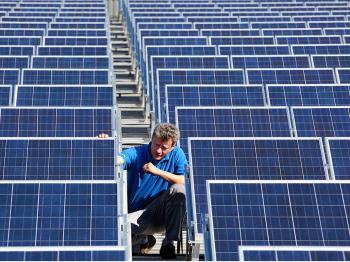A simple project you can do on your own, at home, with ordinary household items, is composting. Home composting offers many benefits to you and the environment because it incorporates the principles of reducing, reusing, and recycling.
Perhaps you’ve heard environmentally conscious people discussing composting—for the home, garden, or toilet. There are a variety of composting methods, but the general process consists of facilitating decomposition of organic material—yard waste, food, even lint from your dyer—which leads to transformation into nutrient-rich soil.
A well-maintained compost should have little or no odor. There are many books and Web sites that offer the “how to” as well as products to help you. So here, we will simply point out the benefits.
One benefit is that composting reduces the amount of waste you put out for the trash collectors, thereby reducing landfill usage. Those plastic garbage bags we all use to put everything in that we throw away take an incredibly long period of time to break down. If you put organic material in a plastic bag, it will also lengthen the period of time needed for it to break down.
The amount of landfill space available is finite. Our human race has already used a lot of that space. With the human population growing at an exponential rate, the amount of waste we produce will also inevitably increase exponentially. If we don’t start looking at ways to reduce how much stuff we keep putting into landfills, it could become a much more serious issue in the near future. A great benefit of composting is that it reduces the amount of trash we throw away.
Our society in general has become a “one-time-use-disposable” society. Toys, electronics, food products, and thousands of other miscellaneous items are made to be used no more than a couple of times and then thrown away. Composting allows you take something that would otherwise be discarded and create something of practical use. Hence, it is recycled.
The recycled material can then be used as soil in your garden or as potting soil. If you are not a gardener, give the precious soil to a neighbor who gardens, or simply add the new, healthy soil back to the earth.
Please think of the benefits and consider composting. If you already recycle cans, bottles, plastics, and paper, and you begin composting, what more would you have to throw away? It’s a great way to help the earth and yourself simultaneously.
The following Web sites offer more insight into how to compost. Please check them out:
en.wikipedia.org/wiki/Composting, composters.com, ecologue.com/ShowTopic/composting, gardeners.com/Composting


